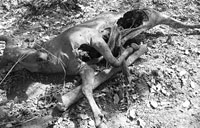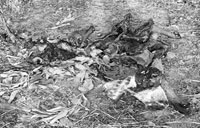
Villagers steal meat from lions
Researchers from Leiden see hungry villagers in the north of Cameroon steal meat from the prey of lions. The researchers from Leiden University's Institute for Environmental Sciences (CML) reported on this kleptoparasitism in the online publication of the African Journal of Ecology in July.
Kleptoparasitism
Kleptoparasitism is a known practice between predators, such as lions, leopards and hyenas, that steal prey from one another or from similar species. For some species, this is even their prime source of food. Certain predators - gull-like birds - chase other birds than gulls until they drop their prey. They then make off with the prey.
Extra busy
The researchers, Marjolein Schoe, Hans de Iongh and Barbara Croes, believe that an increasing number of people are involved in stealing the prey of lions and that this practice puts additional pressure on the already endangered lion species in Cameroon. The researchers describe a proven case of kleptoparasitism in the Bénoué National Park.

Antelope
In the early morning of 28 March 2006, Schoe was tracking two lions that had been fitted with a radio transmitter. (See Leeuwen bellen vanuit de jungle in the newsletter of 14 March 2006.) She came across the lions when they were breakfasting on a new-born antelope. The two lions fled into the bushes as the jeep approached, and stayed there until Schoe left.
Bushes
’When Schoe returned in the afternoon, around 5 o'clock, she saw a number of villagers who, like the lions before them, fled into the bushes as she came near. Knives had been used to remove the meat from the carcass of the antelope; only the head, the hooves and part of the skin remained. Further up, there was a wooden stick and leaves which were probably intended for taking away the meat.
Bororo

‘Marjolein was astonished and in fact angry that the villagers had chased away the lions,' De Iongh relates. 'This observation doesn't really fit within the original aim of this research, but we nonetheless decided to publish it, because it's not so often that people are caught involved in kleptoparasitism.' However, there are strong suspicions that it is happening more and more often. 'According to a herdsman from the Bororo, his tribe often drive lions away from their prey using sticks and fire.' says De Iongh, who has heard of similar practices from researchers in other parts of Africa who also work with lions.
Plio-Pleistocene
The people steal the meat to provide themselves with enough protein, and the lions and sufficiently fearful of humans to let themselves be driven away. De Iongh knows of a village in the Central African Republic where lions are tolerated in the surrounding area, simply because they are a means for the villagers to acquire meat. The researchers believe that kleptoparasitism by humans can be traced back to the Plio-Pleistocene period (2.5 to 1.5 million years ago). These ancestors of present-day humans are believed to have driven predators away from their prey in order to obtain meat.
Poachers
The researchers fear that kleptoparasitism can have harmful effects. 'I believe that this practice can have a damaging effect on the lion population,' says De Iongh. ‘The lions have to put a disproportionate amount of energy into catching new prey if their catch is stolen.' In the Waza National Park, it is believed that the population of 50 to 60 lions in the nineties has been decimated and reduced to between 12 and 20 in 2008 when the last count was made. Every year, some 6 lions are killed by cattle farmers and poachers in Bénoué National Park, so kleptoparasitism can even cause the rate of extinction to be speeded up.
African Journal of Ecology:
Humans displacing lions and stealing their food in Bénoué National Park, North Cameroon
Marjolein Schoe, Hans H. de Iongh, Barbara M. Croes
(29 July 2009)
